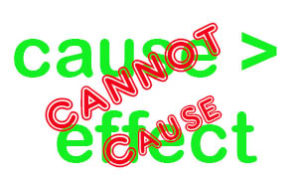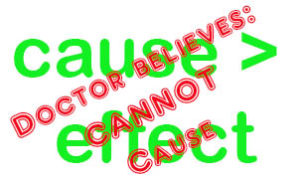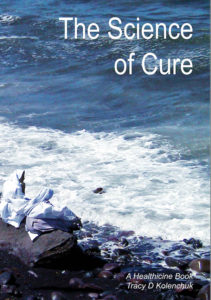 Understanding placebo effect is a serious challenge for conventional medicine. But, it’s not what you think.
Understanding placebo effect is a serious challenge for conventional medicine. But, it’s not what you think.
The problem only appears deep because no one is looking below the surface.
Placebo effects are trivial.
Placebo effects are caused by the doctor. Claims of placebo effect are claims without scientific foundation. Claims of placebo effect are often gaslighting, medical chauvinism, based on the doctor’s opinions or beliefs, or the medical system’s inherent beliefs.
Placebo effects exist when:
- the doctor believes a patient has a medical condition
- the doctor believes the condition has been treated, by the doctor, by another doctor, or perhaps self-treated by the patient.
- the doctor observes or believes the treatment was followed by an improvement in the patient’s condition.
- the doctor believes the improvement was NOT caused by said treatment.
- the doctor dismisses the treatment, often dismissing the benefit as well, calling it a “placebo effect”.
- The doctor does not know the cause of the improvement. If the cause is known, it’s a real effect with a real cause, not a placebo effect.
Placebo effects are created in the mind of the doctor. Placebo effects are not caused by the beliefs of the patient, they are caused by the beliefs of the doctor.
Don’t believe it? Let’s check the dictionaries.
Webster’s Placebo Effect: “improvement in the condition of a patient that occurs in response to treatment but cannot be considered due to the specific treatment used“.
At first, it doesn’t make sense. An effect that “occurs in response to treatment” but “cannot be… due to the treatment“. What does the Oxford dictionary say:
Oxford’s Placebo Effect: “A beneficial effect produced by a placebo drug or treatment, which cannot be attributed to the properties of the placebo itself, and must therefore be due to the patient’s belief in that treatment.”
Oxford’s definition is longer and more confusing. It mixes placebos and treatments as if they are one and the same. e.g. the benefit cannot be “attributed to..the placebo” but must be due to “belief in…treatment“.
The second main difference between the Oxford definition and Webster’s is the gaslighting conclusion, the claim that a placebo effect “must be due to the patient’s belief in that treatment“.
This is, unfortunately, the definition most common, most often accepted, even meticulously accounted for in scientific studies. It is a claim often extended to invalidate and dismiss not just the perceived cause, but even to dismiss the real benefit, resulting in sequences of statements like:
“Placebo effects are caused by the belief of the patient.” which becomes
“Placebo effects are deceptions, due to incorrect beliefs of the patient.” which becomes
“Placebo effects are negative effects, existing only in the mind of the patient.”
It’s simply not true. Placebo effects are positive effects, by definition. There is no proof that the effect “must be due to the patient’s belief“. No proof is attempted. No proof is offered. No proof is possible.
Can anyone bend spoons with their mind? If they believe they can bend spoons, can this belief bend a spoon? No. But anyone who believes they can bend a spoon can make up their mind to bend a spoon and bend a spoon with their body. If their spirits are overly excited, they might bend a spoon intentionally or unintentionally, with their body, or even cause their community to bend a lot of spoons. But belief, by itself, cannot cause spoons to bend. And the beliefs of the mind, by themselves, cannot cause beneficial effects on a medical condition.
“Faith It does not make things easy, it makes them possible.” Luke 1:37
Proof an improvement is caused by belief requires modifying the beliefs of the patient. As soon as we modify the patient’s belief as part of the treatment – all benefits and improvements caused by belief become real effects caused by the treatment. They are no longer placebo effects, by definition.
Problem: Placebo Effects are Good
Webster and Oxford dictionaries agree, and state clearly that a placebo effect is “improvement in the condition of the patient“, “a beneficial effect“.
Bad “good effects“?
What’s the problem? What distinguishes a good “beneficial effect” from a placebo effect, a bad “beneficial effect“?
To understand, we need to examine the definitions more carefully, removing Oxford’s unscientific conclusion: “must be due to the patient’s belief in that treatment” and remove the word “placebo“, which only creates circular confusion.
Webster simplified: “improvement… in response to treatment… cannot be considered due to the treatment”
Oxford Simplified: “beneficial effect produced by… a treatment, which cannot be attributed to the treatment”
Almost identical. For our purposes, we might consider them identical.
It looks like a paradox.
 An improvement,
An improvement,
following a treatment which
cannot cause the treatment.
There is no paradox. The key to dispelling the mysticism, the paradoxical mystery, is resolved by a key word in the final clause in each definition.
Webster: “cannot be…. considered due to the treatment”
Oxford: “cannot be attributed to the treatment”
The definitions don’t say the improvement cannot be CAUSED by the treatment. Who decides what cannot be “considered due to“? The doctor who coins the phrase “placebo effect“.
– a real beneficial effect or improvement
– following a treatment
– where the doctor believes the treatment cannot cause the effect.
Placebo effects are not due to the beliefs of the patient. Placebo effects can only exist when the doctor holds a specific belief: that the treatment did not cause the effect.
Placebo effects are real, positive effects. Real effects have real causes. Real effects become causes that create other effects. What caused the effect labelled a placebo effect? No one cares.
Placebo Effect claims are Gaslighting
When a doctor uses the label “placebo effects“, the search for cause ends. When the doctor says “it’s probably just a placebo effect“, any and all research into the understanding of cause is ignored, dismissed. Doctors don’t just dismiss the cause – they shame it. They gaslight both cause and benefit.
Why would a doctor gaslight a real cause and a real effect? Because the positive effects are not caused by the treatment, not caused by the medicine, not caused by the doctor, not caused by conventional medicine, not caused by the medical establishment.
When a real, positive effect is not caused by a treatment approved by conventional medicine, there are two choices:
- Investigate the cause.
- Dismiss it. Ignore it. Label it “placebo effect“.
Once it is labelled “placebo effect”, the cause becomes irrelevant and is not investigated. The real cause and even the real positive effect are dismissed, ignored, banned – except perhaps for the attention of a few well-meaning researchers trying to “understand” placebo effect – usually by creating their own definitions.
Understanding Placebo Effect is Trivial
Placebo effects are caused by the doctor. Caused by the current paradigm of conventional medicine. Placebo effects are caused by medical chauvinism. Created by a belief that true beneficial effects can only be caused by a medicine. “Placebo effects” is a phrase used to explain away effects, to medically gaslight effects not caused by medicines.
Non-Doctor Placebo Effect Claims
Why do many non-doctors attribute benefits of alternative treatments to “placebo effect“?
It gives them status. When someone says “it’s probably just placebo effect“, they sound just like a doctor. When someone says “it’s definitely placebo effect“, they sound like an authoritative doctor. Instant status. No medical certificate required. No proof is required for any placebo effect claim. Check out, for example, Quackwatch or RationalWiki, which reek of gaslighting, supported by their own unique definitions of placebo effect.
Understanding Placebo Effect
When you see the phrase “placebo effect“, know this:
- every case of a placebo effect is a single case, a story, an anecdote, not a statistic. Statistics are created from collections of related anecdotes.
- every placebo effect is a real positive effect on the medical condition of a patient
- a placebo effect is a claim, not a fact that can be proven, about what is NOT the cause of a real positive effect
- all claims of placebo effect are negative, not positive statements
- every effect has a cause
- every placebo effect has a cause
- once we understand the cause, it’s no longer a placebo effect, it becomes a real effect, with a real cause.
A placebo effect is not the imagination of the patient, it’s the denial of the doctor. It’s denial of cause, denial that cause exists, failure to explore and analyze causes. Placebo effects are a result of intentional failure to study real causes of real beneficial effects.
I’m not suggesting that the doctor are always wrong. We don’t know. The benefit might have roots in the beliefs of the patient. Perhaps all medical benefits have some roots in the beliefs of the patient. The benefit might even be the result of the treatment – the claim is never proven, sometimes it is simply wrong. The benefit might be a result of many other factors. In any case, it’s irresponsible to dismiss analysis of cause and effect.
When we study health, every cause of an improvement is important.
to your health, tracy
Founder: Healthicine



